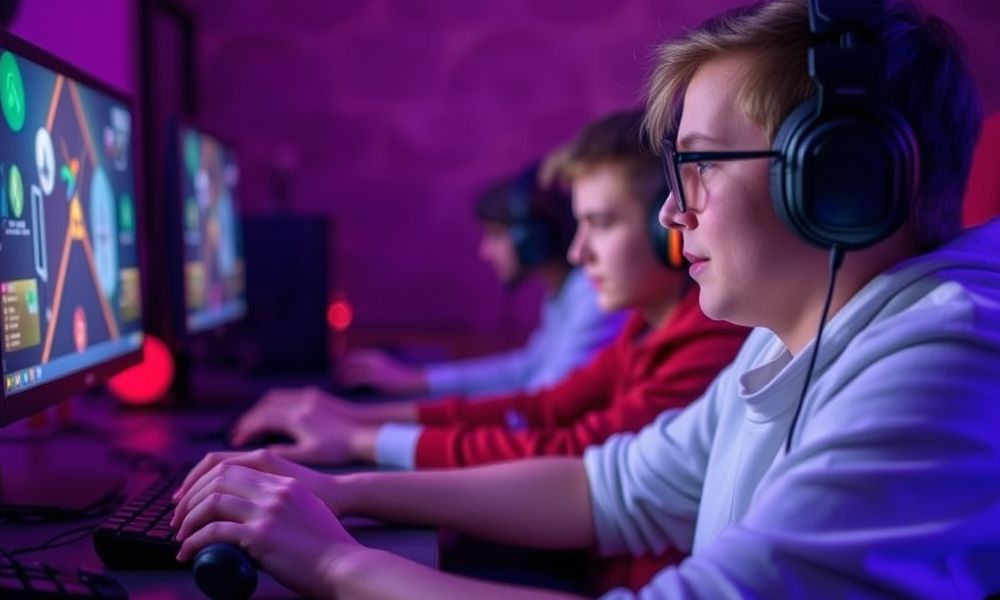You know that moment when you call your kid for dinner and they act like you just asked them to donate a kidney? Yeah, I’m talking about when they’re deep in some game, controllers practically fused to their hands, and suddenly you’re the villain for suggesting they eat actual food.
Look, I get it. Gaming isn’t going anywhere – actually, it’s everywhere. Your neighbor’s 8-year-old probably has better gaming skills than you have life skills, and that’s just the reality we’re living in. But here’s what’s been keeping me up at night (besides my own questionable scrolling habits): what is all this gaming actually doing to our kids’ brains?
The whole video games mental health thing isn’t as black and white as we’d like it to be. It’s not like we can just declare gaming evil and move on with our lives. Trust me, I tried that approach. Spoiler alert: it didn’t work.
So let’s dig into this mess together, shall we? Because somewhere between the doom-and-gloom headlines and the “gaming is totally fine” crowd, there’s probably some truth we can actually use.
Wait… Gaming Can Actually Be Good for Mental Health?
I know, I know. I had the same reaction. But before you start planning your kid’s gaming tournament career, let me break down what the research actually says.
Turns out, some gaming can boost cognitive abilities in pretty interesting ways. Kids who play strategy games tend to get better at problem-solving, and I’m not just talking about figuring out which button makes their character jump. We’re talking real-world problem-solving skills that translate to school and life.
Here’s something that surprised me: online gaming can actually help shy kids develop social skills. I mean, think about it – if your kid struggles with face-to-face conversations, gaming with others online might be their training wheels for social interaction. They’re chatting, cooperating, sometimes arguing (constructively, we hope), and learning how to work as part of a team.
And get this – some games actually help with emotional regulation. When kids play cooperative games, they learn to manage frustration, celebrate team wins, and deal with losses. It’s like social-emotional learning, but disguised as fun.
The stress relief factor is real too. After a rough day at school, sometimes kids just need to escape into a world where they have control, where they can succeed, where nobody’s judging their math skills or their lunch choices.
But – and this is a big but – we’re talking about moderate, balanced gaming here. Not the “I haven’t seen sunlight in three days” kind of gaming that keeps us parents awake at night.
The Dark Side Nobody Wants to Talk About
Let’s be real for a minute. Gaming can absolutely wreck mental health when it goes off the rails. And by “off the rails,” I mean when it becomes the only thing your kid cares about.
Gaming addiction symptoms in children are becoming more common, and they’re not pretty. We’re talking about kids who can’t focus on anything except their next gaming session, who get genuinely distressed when separated from their games, who start lying about how much they’re playing.
The isolation thing hits hard. Kids who spend excessive time gaming often develop fewer real-world friendships. They might have online buddies, sure, but those relationships can be pretty shallow compared to friends they can actually hang out with, laugh with, be awkward teenagers with.
Sleep gets destroyed. I mean completely annihilated. Late-night gaming sessions mess with their circadian rhythms, and then they’re zombies at school the next day. It’s like a domino effect – bad sleep leads to poor concentration, which leads to bad grades, which leads to more stress, which leads to… more gaming as an escape.
And don’t even get me started on violent content. Look, I’m not saying every kid who plays a violent game is going to become aggressive, but repeated exposure to graphic violence can desensitize children. They might start seeing aggressive behavior as normal or acceptable.
The physical health impacts pile up too – eye strain, headaches, poor posture, weight gain from sitting for hours. It’s like their bodies are paying the price for their digital habits.
Red Flags That Should Make You Pay Attention
Okay, so how do you know when your kid’s gaming has crossed from hobby into problem territory? Here are the signs that made me start paying closer attention:
They get genuinely angry or upset when gaming time is over. I’m not talking about normal disappointment – I mean real distress, like you just took away something essential to their survival.
School performance starts slipping. If grades are dropping and teachers are mentioning attention problems, gaming might be part of the equation.
They’re lying about gaming time. When kids start being sneaky about how much they’re playing, that’s usually a sign they know it’s become excessive.
Social withdrawal becomes obvious. If they’re turning down real-world activities they used to enjoy, choosing gaming over hanging out with friends, that’s concerning.
Sleep patterns get weird. Gaming until 2 AM on school nights, falling asleep in class, being grumpy and irritable during the day.
Physical symptoms start showing up – headaches, eye problems, complaints about neck or back pain from poor gaming posture.
They use gaming as their primary coping mechanism. When stressed, upset, or bored, gaming is their only solution.
Creating Healthy Gaming Habits That Actually Stick
Here’s where most parents mess up (myself included, let’s be honest). We either try to ban gaming entirely or we just throw up our hands and let them game without limits. Neither approach works great.
Setting realistic time limits is crucial, but here’s the thing – you need to involve your kid in creating these limits. When they help decide the rules, they’re more likely to follow them. Start with what feels reasonable for your family, not what some expert online says is “ideal.”
Create tech-free zones in your house. Bedrooms should be screen-free spaces, especially at night. I know, I know, good luck with that battle. But seriously, sleep is too important to mess around with.
Make gaming a privilege that’s earned, not a right. Homework done? Chores finished? Then gaming time can happen. It teaches them that responsibilities come first.
Encourage variety in their gaming choices. All violent games all the time isn’t healthy. Mix in some puzzle games, creative games, educational content.
Model good screen habits yourself. If you’re constantly on your phone while telling them to get off their games, mixed messages much?
When to Actually Worry and Seek Help
Sometimes the situation goes beyond what parents can handle alone. Gaming addiction treatment for children is becoming more available as professionals recognize this as a real issue.
If your kid shows signs of depression or anxiety that seem connected to their gaming habits, it’s time to talk to someone professional. Same goes if they’re having angry outbursts that feel out of proportion, or if they seem completely unable to control their gaming time despite multiple attempts.
School counselors can be a great first resource – they’ve seen this stuff before and can help you figure out next steps. Don’t wait until things are completely out of control.
Therapists who specialize in gaming issues can work with kids to develop healthier coping strategies and help families set boundaries that actually work.
The Age Factor Nobody Talks About Enough
Different ages need different approaches to healthy gaming habits for kids. A 6-year-old’s brain is not the same as a 16-year-old’s brain, and our expectations should reflect that.
Young kids (under 8) need lots of hands-on supervision. They don’t understand time limits intuitively, and they definitely don’t understand online safety. Co-playing with them is actually pretty fun – you get to see what they enjoy and monitor content at the same time.
Tweens (8-12) can start learning self-regulation, but they still need clear, consistent boundaries. This is when you can start involving them in creating family gaming agreements.
Teens are tricky because they want independence, but their brains are still developing impulse control. They need boundaries that feel respectful rather than controlling, which is… challenging.
Online Safety Without Being the Fun Police
Online gaming mental health risks extend beyond just screen time. The social aspects of gaming can expose kids to cyberbullying, inappropriate content, and predatory behavior.
Teaching kids about online stranger danger is crucial, but so is teaching them about more subtle boundary violations. Someone asking too many personal questions, trying to move conversations off the gaming platform, or making them uncomfortable in any way.
Parental controls are helpful, but they’re not foolproof. Teaching kids to think critically about online interactions is probably more valuable long-term.
Regular check-ins about their online experiences help normalize talking about both positive and negative interactions they might have while gaming.

Screen Time Balance That’s Actually Realistic
The American Academy of Pediatrics suggests limiting screen time, but let’s be practical here. In 2025, screens are everywhere, and pure screen time limits might not be the most helpful approach.
Instead, focus on screen time quality and balance. Are they doing other activities they enjoy? Are they sleeping enough? Are they connecting with family and friends offline? Are they keeping up with responsibilities?
If the answers are yes, then maybe their gaming time is fine, even if it seems like “a lot” compared to what we grew up with.
Create screen-free family time that’s actually enjoyable, not just another rule to follow. Family game nights (board games count!), outdoor activities, cooking together – whatever works for your family.
Communication Strategies That Don’t Start World War III
Talking to kids about their gaming without it turning into a battle requires some finesse. Ask open-ended questions about what they enjoy about their games rather than immediately expressing concerns.
“What’s your favorite thing about that game?” usually gets better responses than “You’re gaming too much.”
Show genuine interest in their gaming world. Let them teach you about their favorite characters or explain game strategies. This builds connection and gives you insight into what they’re actually experiencing.
When you do need to set limits or express concerns, focus on specific behaviors rather than gaming in general. “I’ve noticed you seem tired at school lately” is easier to hear than “Gaming is ruining your life.”
Practical Alternatives They Might Actually Choose
The key to reducing gaming time isn’t just taking it away – it’s providing alternatives that are equally engaging. This is harder than it sounds because games are specifically designed to be compelling.
Physical activities that have a social or competitive element often work well. Martial arts, team sports, or even just regular trips to the local skate park.
Creative pursuits can scratch some of the same itches as gaming. Art projects, music, writing, building things – these activities provide the satisfaction of creating and accomplishing something.
Social activities that don’t revolve around screens help kids develop face-to-face social skills. This might mean organizing playdates for younger kids or helping teens find clubs or activities where they can meet like-minded peers.
Building Family Gaming Agreements That Work
A family gaming agreement sounds formal, but it’s really just a way to get everyone on the same page about expectations and consequences.
Include your kids in creating the agreement. What games are okay? When can gaming happen? How long is reasonable? What needs to be done first? What happens if the rules aren’t followed?
Make the consequences logical and related to gaming rather than random punishments. If they game past bedtime, they lose gaming privileges the next day. If they don’t finish homework, gaming waits until it’s done.
Review and adjust the agreement regularly. What works for a 10-year-old might not work for a 13-year-old.
Supporting Kids Who Game Socially
For many kids, gaming is their primary way of socializing with friends, especially after experiencing social isolation during the pandemic. This makes it more complicated to simply limit gaming time.
Help them understand the difference between gaming with real friends and gaming with strangers. Encourage gaming sessions with classmates or kids they know in real life when possible.
Teach them about healthy online friendships – how to maintain appropriate boundaries, how to recognize when someone is being inappropriate, how to exit uncomfortable situations.
Consider facilitating in-person gatherings where kids can game together in the same room. It combines the social aspects they love with face-to-face interaction.
Mental Health Benefits We Shouldn’t Ignore
Some research suggests that certain types of gaming can actually support mental health in positive ways. Games designed for anxiety management, attention training, or social skills development are being used therapeutically.
Cooperative games can build teamwork skills and create a sense of belonging, which is protective for mental health. Kids who struggle to fit in elsewhere might find their community through gaming.
Achievement systems in games can boost self-esteem for kids who struggle academically or socially. The sense of progression and mastery can be genuinely helpful for building confidence.
Problem-solving games can improve cognitive flexibility and help kids feel more capable of handling challenges in real life.
Final Thoughts on This Complicated Mess
Look, here’s the bottom line: video games mental health effects aren’t simple. Gaming isn’t inherently good or bad – it’s a tool that can be used in healthy or unhealthy ways.
The goal isn’t to eliminate gaming from our kids’ lives entirely. The goal is to help them develop a healthy relationship with gaming that enhances rather than replaces other aspects of their lives.
Pay attention to the whole picture – how your child is doing socially, academically, physically, and emotionally. If gaming seems to be supporting their overall well-being, great. If it’s causing problems, then it’s time to make some changes.
And remember, you don’t have to figure this out alone. Other parents are dealing with the same challenges, professionals are available to help when needed, and your kid is probably more reasonable about this stuff than you expect if you approach conversations with curiosity rather than judgment.
This isn’t about being the perfect parent or having the perfect gaming setup. It’s about doing our best to raise healthy, happy kids in a digital world that’s changing faster than any of us can keep up with.
Quick Takeaways
Gaming can genuinely support cognitive development and social skills when used moderately and appropriately
Warning signs of problematic gaming include social withdrawal, academic problems, sleep disruption, and emotional distress when gaming is limited
Age-appropriate supervision and boundaries are more effective than blanket restrictions or complete freedom
Online safety education is just as important as time limits when it comes to gaming mental health
Family gaming agreements work best when kids help create them and understand the reasoning behind the rules
Professional help is available when gaming problems go beyond what families can handle alone
The goal is balance and healthy habits, not elimination of gaming entirely
Frequently Asked Questions
How much gaming time is too much for my child? There’s no magic number that works for every kid, but if gaming is interfering with sleep, school, friendships, or family time, it’s probably too much. The American Academy of Pediatrics suggests focusing on content quality and life balance rather than strict time limits for school-age children.
What are the early signs of gaming addiction in children? Early warning signs include difficulty stopping gaming when asked, using gaming as the primary way to cope with stress, lying about gaming time, declining school performance, and choosing gaming over activities they used to enjoy. If you notice several of these signs together, it’s worth addressing.
Are violent video games really harmful to children? Research shows mixed results, but repeated exposure to graphic violence can desensitize children and potentially increase aggressive thoughts and behaviors. The impact varies by individual child, their age, and how much violent content they’re consuming. Moderation and age-appropriate content choices are key.
How can I get my child to talk to me about their gaming experiences? Show genuine interest in their games without immediately expressing concerns. Ask what they enjoy about specific games, let them teach you about characters or strategies, and avoid starting conversations when you’re already frustrated about their gaming time.
When should I consider getting professional help for my child’s gaming habits? Consider professional help if your child shows signs of depression or anxiety related to gaming, has angry outbursts when gaming is limited, seems unable to control gaming time despite multiple attempts, or if gaming is significantly impacting their school performance, sleep, or social relationships.
Can gaming actually help with my child’s mental health? Yes, when used appropriately, gaming can provide stress relief, social connection, confidence building, and cognitive stimulation. Some games are specifically designed to help with anxiety management or social skills development. The key is ensuring gaming supplements rather than replaces other healthy activities.
How do I protect my child from online predators while gaming? Teach your child never to share personal information online, explain how to recognize inappropriate requests or behavior, use parental controls when available, and maintain open communication about their online interactions. Regular check-ins about their gaming experiences help normalize discussing both positive and concerning interactions.



